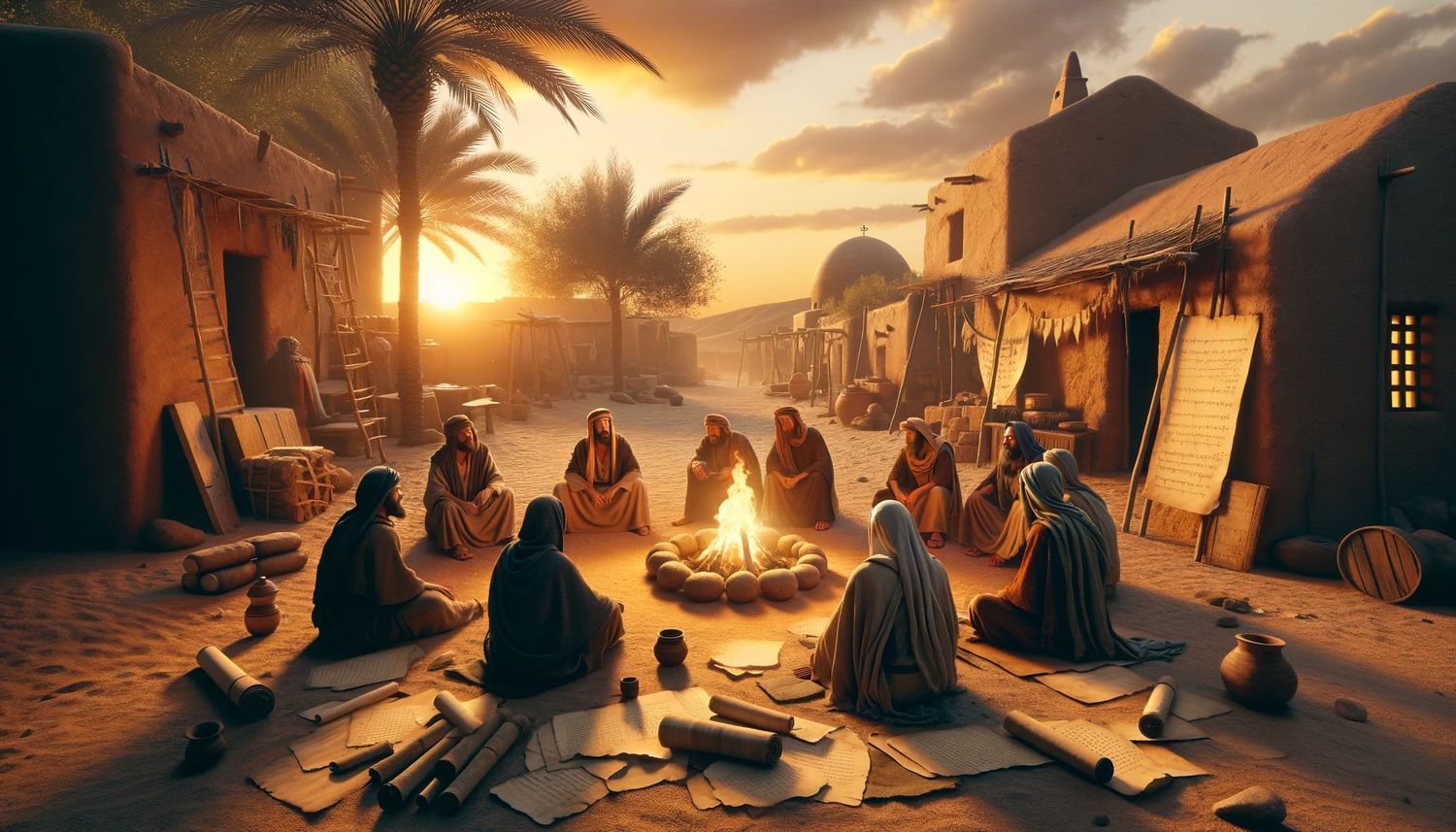Home>Christian Videos>Bible Stories>When Were The Gnostic Gospels Found


Bible Stories
When Were The Gnostic Gospels Found
Published: March 6, 2024
Ericka Andersen, an editor at Christian.net, expertly merges digital strategy with content creation, focusing on faith and societal issues. Her communication skills enhance the platform's engaging narratives, fostering meaningful dialogue on belief's impact on society.
Discover the fascinating history of the Gnostic Gospels and their impact on biblical narratives. Uncover the origins and significance of these ancient texts. Explore the Gnostic Gospels and their influence on traditional Bible stories.
(Many of the links in this article redirect to a specific reviewed product. Your purchase of these products through affiliate links helps to generate commission for Christian.net, at no extra cost. Learn more)
Table of Contents
Introduction
When were the Gnostic Gospels found? The discovery of the Gnostic Gospels is a fascinating chapter in the history of religious texts. The Gnostic Gospels are a collection of early Christian texts that were discovered in 1945 near the town of Nag Hammadi in Egypt. These texts provide valuable insights into the diverse beliefs and practices within early Christianity and have sparked significant scholarly and public interest. In this article, we will explore the discovery, content, significance, and impact of the Gnostic Gospels on Christianity. Let's delve into the intriguing world of the Gnostic Gospels and uncover their historical and religious importance.
Read more: When Were Gnostic Gospels Written
The Discovery of the Nag Hammadi Library
The discovery of the Nag Hammadi Library is a remarkable tale of chance and curiosity. In December 1945, an Egyptian peasant stumbled upon a large earthenware jar while digging for fertilizer near the town of Nag Hammadi. Little did he know that this chance discovery would lead to one of the most significant finds in the history of early Christianity. The jar contained a collection of ancient manuscripts, which would later be known as the Nag Hammadi Library. These manuscripts, written in Coptic, included a diverse range of texts, including gospels, acts, and apocalyptic writings. The discovery of these texts shed new light on the early Christian movement and provided a window into the rich tapestry of beliefs and practices that existed within the early Christian communities.
The circumstances surrounding the discovery of the Nag Hammadi Library are shrouded in mystery and intrigue. The exact origins of the texts and how they came to be buried in a remote location in Egypt remain a subject of scholarly debate. However, what is clear is that the discovery of these ancient manuscripts has had a profound impact on our understanding of early Christianity and the diversity of beliefs that characterized the early Christian movement. The Nag Hammadi Library has opened a door to a world of ancient Christian literature that was previously unknown, offering a glimpse into the theological and philosophical debates that shaped the early Christian communities.
The Content of the Gnostic Gospels
The Gnostic Gospels, found in the Nag Hammadi Library, encompass a diverse array of texts that offer unique perspectives on early Christian beliefs and practices. These texts include gospels attributed to figures such as Thomas, Philip, and Mary Magdalene, as well as apocryphal acts and revelations. One of the most famous texts found in the Nag Hammadi Library is the Gospel of Thomas, a collection of sayings attributed to Jesus. Unlike the canonical gospels, the Gnostic Gospels often present esoteric teachings and mystical insights into the nature of the divine and the human condition.
The Gnostic Gospels also contain cosmological and mythological narratives that differ from the traditional Christian narratives found in the New Testament. These texts explore the concept of a divine realm beyond the material world and the idea of salvation through gnosis, or spiritual knowledge. The Gnostic Gospels challenge conventional understandings of Christian theology and offer alternative perspectives on the nature of God, the universe, and the human soul.
In addition to their theological and philosophical content, the Gnostic Gospels provide glimpses into the social and cultural dynamics of early Christian communities. These texts reflect the diversity of beliefs and practices that existed within the early Christian movement, shedding light on the complex and multifaceted nature of early Christianity. The Gnostic Gospels offer a rich tapestry of religious thought and spiritual exploration, presenting a compelling alternative to the orthodox Christian tradition preserved in the New Testament.
The content of the Gnostic Gospels invites readers to reconsider the boundaries of early Christian thought and to engage with the diverse range of perspectives that characterized the formative period of Christianity. These texts challenge traditional understandings of Christian orthodoxy and offer a window into the vibrant and dynamic world of early Christian spirituality and theology. The Gnostic Gospels continue to captivate scholars and spiritual seekers alike, inviting them to explore the rich and complex landscape of early Christian literature and thought.
The Significance of the Gnostic Gospels
The Gnostic Gospels hold profound significance for our understanding of early Christianity and the diversity of beliefs within the Christian movement. These texts provide a window into the rich tapestry of religious thought and spiritual exploration that characterized the formative period of Christianity. The significance of the Gnostic Gospels can be understood in several key aspects:
-
Diversity of Early Christian Thought: The Gnostic Gospels challenge the notion of a monolithic and uniform early Christianity. Instead, they reveal the diverse and often conflicting theological perspectives that existed within the early Christian communities. By presenting alternative narratives and theological concepts, the Gnostic Gospels highlight the complex and multifaceted nature of early Christian thought.
-
Alternative Christian Traditions: The Gnostic Gospels represent alternative Christian traditions that were not incorporated into the orthodox Christian canon. These texts offer a glimpse into the rich landscape of early Christian literature and theology, presenting perspectives that diverge from the theological framework preserved in the New Testament. The Gnostic Gospels invite us to consider the plurality of early Christian beliefs and the dynamic interplay of ideas within the early Christian movement.
-
Spiritual and Philosophical Insights: The Gnostic Gospels offer unique spiritual and philosophical insights into the nature of the divine, the human condition, and the quest for spiritual knowledge. These texts explore esoteric teachings, cosmological myths, and mystical visions that challenge conventional understandings of Christian theology. The Gnostic Gospels provide a platform for exploring alternative modes of religious experience and philosophical inquiry within the early Christian context.
-
Impact on Christian History: The discovery of the Gnostic Gospels has had a profound impact on the study of Christian history and theology. These texts have prompted scholars to reevaluate the development of early Christian thought and the process of canonization within the Christian tradition. The Gnostic Gospels have sparked debates about the boundaries of orthodoxy and heresy in early Christianity, shedding light on the complex and contested nature of Christian theological diversity.
-
Contemporary Relevance: The Gnostic Gospels continue to captivate the interest of scholars, theologians, and spiritual seekers in the contemporary world. These texts inspire ongoing exploration and dialogue about the nature of Christian spirituality, the diversity of religious thought, and the boundaries of orthodoxy. The Gnostic Gospels challenge us to engage with the complexities of early Christian history and to consider the enduring relevance of their spiritual and philosophical insights.
The significance of the Gnostic Gospels lies in their capacity to expand our understanding of early Christianity, to provoke critical reflection on the diversity of religious thought, and to inspire ongoing exploration of the rich tapestry of Christian spirituality and theology. These texts continue to invite us to reconsider the boundaries of Christian orthodoxy and to engage with the vibrant and dynamic world of early Christian literature and thought.
The Impact of the Gnostic Gospels on Christianity
The Gnostic Gospels have left a lasting impact on Christianity, shaping the way we understand the development of the Christian tradition and the diversity of beliefs within early Christianity. The impact of the Gnostic Gospels on Christianity can be observed in several key areas:
-
Reevaluation of Early Christian History: The discovery of the Gnostic Gospels has prompted scholars to reevaluate the history of early Christianity. These texts challenge traditional narratives of Christian origins and invite a reconsideration of the diverse theological currents that characterized the early Christian movement. The Gnostic Gospels have expanded our understanding of the complex and multifaceted nature of early Christian history, prompting a reexamination of the development of Christian theology and the formation of the New Testament canon.
-
Diversity of Christian Beliefs: The Gnostic Gospels have highlighted the diversity of beliefs and practices within early Christianity. These texts present alternative theological perspectives that diverge from the orthodox Christian tradition preserved in the New Testament. By showcasing the plurality of early Christian thought, the Gnostic Gospels have challenged the notion of a uniform and monolithic early Christianity, inviting a more nuanced understanding of the theological landscape of the formative Christian period.
-
Challenges to Christian Orthodoxy: The Gnostic Gospels have sparked debates about the boundaries of Christian orthodoxy and heresy in early Christianity. The theological concepts and cosmological myths presented in these texts have raised questions about the formation of orthodox Christian doctrine and the process of canonization. The Gnostic Gospels have prompted critical reflection on the construction of Christian orthodoxy and the contested nature of theological diversity within the early Christian communities.
-
Influence on Christian Theology: The Gnostic Gospels have influenced the study of Christian theology, inspiring new avenues of inquiry into the nature of Christian spirituality and the diversity of religious thought. These texts have prompted theologians to engage with alternative theological concepts and to consider the implications of the Gnostic worldview for contemporary Christian theology. The Gnostic Gospels continue to stimulate theological discourse and reflection on the complex interplay of ideas within the early Christian tradition.
-
Contemporary Relevance: The impact of the Gnostic Gospels extends to the contemporary world, where these texts continue to inspire dialogue and exploration of the diversity of Christian spirituality. The Gnostic Gospels challenge contemporary Christians to engage with the complexities of their religious heritage and to consider the enduring relevance of the spiritual and philosophical insights presented in these ancient texts. The impact of the Gnostic Gospels on Christianity resonates in ongoing discussions about the nature of Christian orthodoxy and the diversity of religious thought.
The impact of the Gnostic Gospels on Christianity is profound, shaping our understanding of early Christian history, theology, and spirituality. These texts have left an indelible mark on the study of Christian origins and continue to provoke critical reflection on the diversity of beliefs within the Christian tradition. The Gnostic Gospels invite us to reconsider the boundaries of Christian orthodoxy and to engage with the vibrant and dynamic world of early Christian literature and thought.















